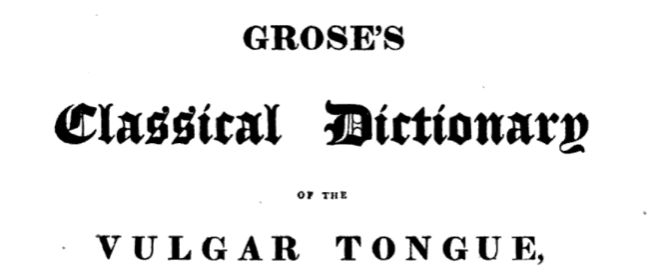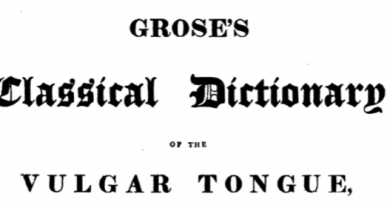Dictionary of the Vulgar Tongue – Day 220
The Dictionary of the Vulgar Tongue was first published at the end of the eighteenth century, and given that the current health crisis is giving too much time to read books, I thought I’d pick a daily word from it until I got bored….
Neck Verse
This phrase is defined by Grose as “formerly the persons claiming the benefit of clergy were obliged to read a verse in a Latin manuscript psalter: this saving them from the gallows, was termed their neck verse: it was the first verse of the fiftyfirst psalm, Miserere mei,&c”. Firstly, as an aside, &c is the archaic version of etc, which I found interesting in its own right. I do need, as I may have mentioned, to get out more….
This whole concept is fascinating, dating back to the times of when the two great powers in the country were the Church and the Monarchy. Both had their own legal systems, their own lands, their own powers and the Church didn’t like interference from Monarchs, and Kings and Queens were generally respectful of God. But, anyway, to cut a long story short, clergy could be tried in the secular courts, but they could also claim the ‘benefit of the clergy’.
This claim allowed them to either get off the crime, or for the sentence to be modified (in effect, initially the case was transferred to the Ecclesiastical Courts which were more favourable), but it was also abused. So, the aim was to read Psalm 51, which Grose mentions, to prove that they were a member of the clergy. There were some big flaws in this system, notably that non religious figures could just learn the passage. The courts over time wised up to this, so they could ask the defendant to read another passage from the Bible, a useful mechanism as the clergy could read and write, whereas many others at the time couldn’t. If someone couldn’t read a passage, they could be killed or sentenced as planned.
King Henry VIII didn’t like this whole set-up (there are plenty of things he didn’t quite like), although he did still respect the principles of the code, although he added more restrictions and limitations. The whole process lingered for longer than might be expected (well, longer than I had expected), although by the eighteenth century, the cases were no longer transferred to the Ecclesiastical Courts and were just treated more leniently in the secular courts.
So, when Grose wrote about the “neck verse”, the law still favoured anyone at that time who could read that verse from the Bible and it could save their life. The matter was finally dealt with in 1823, and reinforced in 1841, so that this ‘benefit’ was struck from the legal code in the country. It’s a wonderful example of how power waxed and waned between the church and the monarch though over the centuries, and just how long the church’s influence lasted for.




